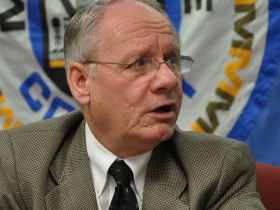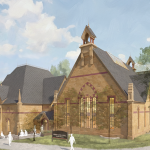Remembering Tom Nardelli
There was a little of Bob Newhart in Nardelli, but he helped improve the city in important ways.
I first met Lieutenant Tom Nardelli in April 1971 in the Army Reserve Recruiting office at the Training Center on Silver Spring. He and future Milwaukee Firefighter Don Piotrowski (later Don Preston) were administrators and recruiters for the 84th Division. I was about to graduate from UW-Madison and had received a low draft lottery number, 35, low enough for me to surely be drafted. I’d heard that with the Vietnam war winding down vacancies existed in the Army Reserves.
Nardelli and Piotrowski were courteous although as our conversation turned to why I was seeking to enlist I sensed they were gung-ho military and probably not all that thrilled to be signing up another Mad grad avoiding a trip to Vietnam. Of course as Reservists themselves they weren’t heading to Vietnam either. Anyway, I filled out my application, it was processed and I entered the US Army Reserve on July 7, 1971. I was ultimately assigned to Nardelli’s unit, the 452d General Hospital. I was now slated to become a medic. After my training in the medic school at the Brook Army Medical center in San Antonio, I returned to Milwaukee as a Private First Class, where Nardelli was captain of our unit. I was in (and under) his chain of command.
Captain Nardelli was what soldiers call “strack”. His uniform was starched and pressed and his salute was crisp. Other officers, mostly MDs and nurses, were more casual about their clothes and army regulations. This sometimes made Nardelli come off like Major Frank Burns of the old “Mash” TV show. Once the 452d held a weekend training session at Camp McCoy where we practiced loading, firing and cleaning M16s and watched artillery fire from a safe distance. We reservists were called into formation by our immediate officers and then waited for the ranking officer on the scene, Nardelli, who had just been promoted to Major. Nardelli exited the headquarters building and approached the formation holding a swagger stick and wore his pants bloused with knee-high boots like in pictures of Generals George Patton and Black Jack Pershing. The assembled weekend warriors simultaneously broke into laughter and Nardelli turned around as if forgetting something and then reappeared, smiling, without the parade baton and with his pants bloused closer to his ankles.
In situations like that Nardelli had a sense of humor about himself. He wasn’t really Frank Burns but rather more like Bob Newhart realizing that the world around him wasn’t as ordered and logical as he’d like. Nardelli was a fan of the Newhart show and at times could flash a similarly low-key sense of humor. He was competent and completely dedicated to the 452d and its members.
Nardelli was elected to the Common Council in 1988 when I was elected mayor. We met in my office. We joked about the role reversal from our time together at the 452d, but we both knew he wouldn’t be an alderman that any mayor could command. He said he was a conservative and no doubt thought of me as a liberal even though AFCSME, the Milwaukee Police and Firefighters unions had all backed my opponent. During my first four years Nardelli held himself out as part of the opposition. Despite this, when budget issues came up, we often worked together. During my time as mayor, city government employment rolls were reduced by about 1,000. We also stabilized Milwaukee’s pension fund reducing taxpayer risk. Milwaukee’s pension system is fully funded and Tom Nardelli was one alderman who helped with the tough decisions that made that possible. Unlike most self professed conservatives in local government Tom actually often voted to cut spending.
Nardelli played a key role in reforming the city health department, which was too focused on providing direct medical services duplicating Medicaid and not enough on public health. Back in the 1970s when Medicaid was first established, Health Commissioner Constantine Panagis and his employees had seen Medicaid as a threat to the work of the department and actually negotiated agreements with Medicaid health providers prohibiting Medicaid eligible children from getting immunized by anyone other than the City of Milwaukee. This protected work for the city’s health employees, but also drove the immunization rate below 30 percent and cost property taxpayers for a service the federal government already taxed them for. Imagine parents and their children being forced to go two places to get shots paid for with property taxes when they could have had them in their doctors office at federal expense. A measles epidemic broke out as a result. When Nardelli realized what was happening, he led the council in changing the rules (in a measure I supported) so that Medicaid providers were required to provide immunizations. The immunization rate soon climbed back to a safer level over 80 percent.
Tom Nardelli is survived by a wonderful wife, Marcia and three children. He was a genuine conservative who gained respect and friends across ideological lines. For example Democratic Milwaukee County Clerk Joe Czarnezki was a friend of Tom’s. Their sons attended Rufus King High School together. Spencer Coggs, David Riemer and Nardelli all attended Riverside High and remained friends. Tom Nardelli served with distinction at every stage of his career and from my perspective added great value to the city he served.
John Norquist served as Mayor of Milwaukee from 1988 to 2004. He is currently an adjunct professor at DePaul University and the John M DeGroves Eminent Scholar at Florida Atlantic University’s School of Regional Planning and Urban Design.
Political Contributions Tracker
Displaying political contributions between people mentioned in this story. Learn more.























Well said, Mayor. RIP
Nice piece. Great memory of Ald. Nardelli.